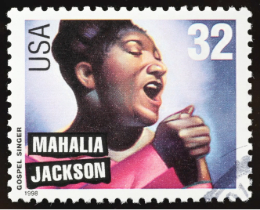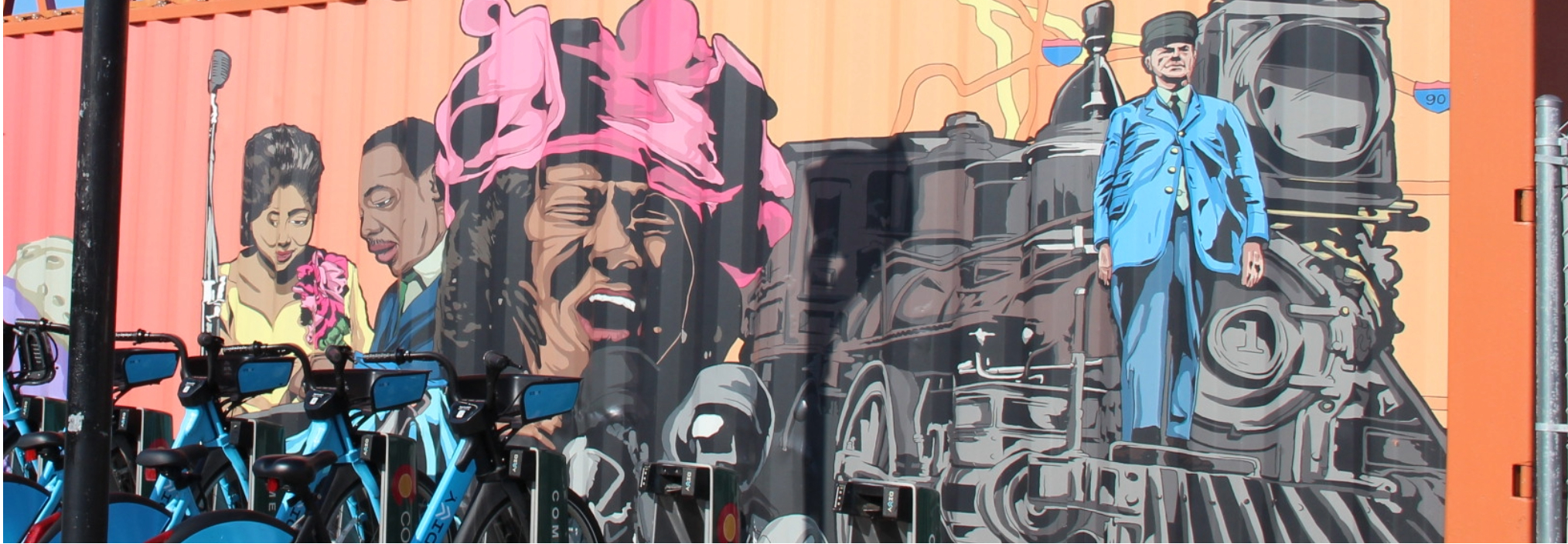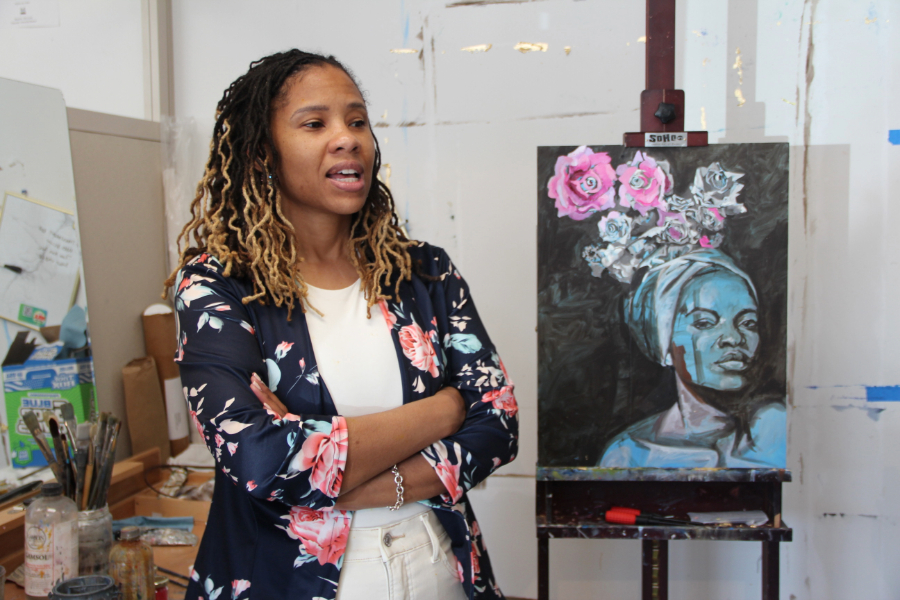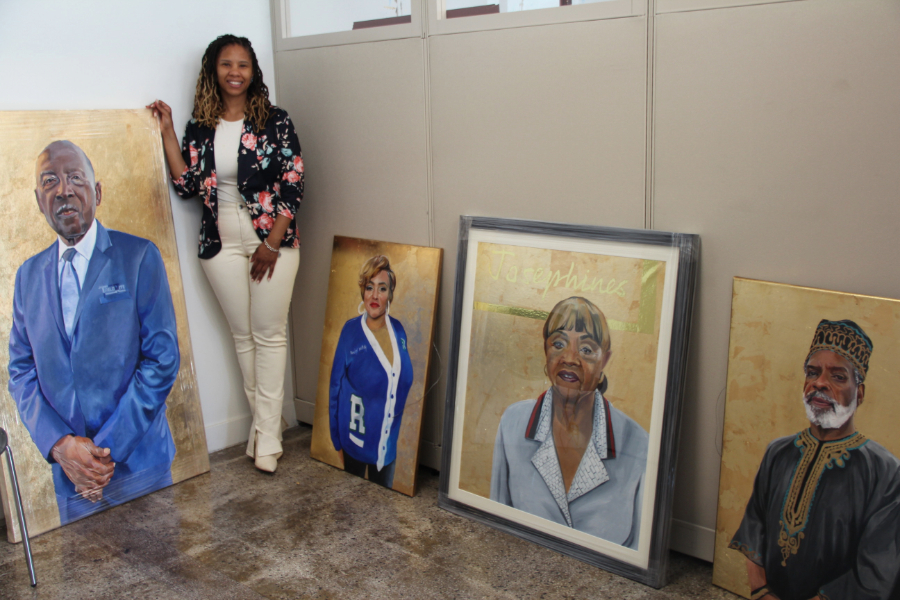A one-mile corridor on Chicago’s South Side is vital to a collaborative effort that is reinvigorating a culturally and economically rich community.
Laughter and sunlight filled Mahalia’s on a pleasant spring afternoon as women played party games amid crafts, paintings, books, and clothes created by local artisans. It was the day before Mother’s Day. Artist Kristen Williams, who runs the boutique and works in a back studio stocked with her portraits of community leaders set against gold-leaf backgrounds, was hosting an event.
The corner storefront marks the eastern edge of Mahalia’s Mile, a stretch of 79th Street in Chicago that celebrates the legacy of the gospel singer, civil rights icon, and entrepreneur Mahalia Jackson. The section of 79th is also a key piece in the revitalization of four culturally rich, contiguous neighborhoods on the city’s South Side.

The driving force behind the revitalization is the Greater Chatham Initiative (GCI), a collaborative of more than 250 individuals and organizations working in Avalon Park, Auburn Gresham, Chatham, and Greater Grand Crossing.
As part of that effort, GCI helped bring about an important turning point in February, when the state of Illinois awarded official Cultural District Designation to Mahalia’s Mile. The selection made the area eligible to apply for $3 million in state funding to foster economic development and preserve the district’s unique cultural identity.
The designation was one step to nurture creativity and talent along the one-mile corridor of 79th Street. Long known for its rich culture and economic history, the area has endured disinvestment in recent decades—a decline that the COVID-19 pandemic exacerbated. The result was a commercial vacancy rate of around 40 percent in storefronts and high turnover in residential rental units along 79th Street.
East to West
Established in 2016, GCI is working to reverse that trend by revitalizing and upgrading housing while restoring market activity, enhancing retail and other community amenities, and connecting resident job seekers and businesses to opportunities. The initiative also is leveraging public sector investments to attract, grow, and sustain private sector investment and middle-class residents.
The opening of Mahalia’s in February 2024 was an important spark. Williams, the proprietor-artist of Mahalia’s, said she hopes to enhance the boutique’s influence by providing classes for vendors to learn more about marketing, business, and finance.
“The art is what brings people in,” Williams said, “and we’re trying to create a community of artists to learn and collaborate and grow from each other. As a collective, we can help each other. We can access one another’s resources.”
"As a collective, we can help each other. We can access one another’s resources."
Another key component emerged in September 2022 on the western end of 79th Street. GCI coordinated a group of designers, architects, developers, churches, artists, and others in the neighborhood to transform a once-vacant, 8,500-square-foot lot on the corner of State Street into a public outdoor plaza. The plaza, Mahalia Jackson Court, includes a community garden, picnic tables, murals, and space for pop-up events.
In the months after the plaza was created, GCI data indicated foot traffic at the corner increased more than 200 percent. GCI is also working on transforming retail storefronts in response to indications that many of the estimated 3,000 home-based businesses in the area are interested in quality, affordable retail space on or near 79th Street.
“The housing stock along 79th Street is historic–commercial buildings, beautiful legacy terracotta buildings,” GCI Executive Director and 2024 Leader for a New Chicago, Nedra Sims Fears said. “But the storefronts haven’t been renovated in the last 20, 30, 50 years. We could convert them to live-work housing spaces, to B&B suites, residential housing that is accessible for people who are disabled, and co-working spaces.”
Creating a Culinary Capital
The cultural district hosts more than 60 dining establishments, including Tropic Island Jerk Chicken and Just Jerk Café—all of which contribute to Chatham’s reputation as the soul food, Caribbean, and West African culinary capital of Chicago.
The establishments draw visitors from across the Chicago area and locals who appreciate a walkable main drag.
The establishments draw visitors from across the Chicago area and locals who appreciate a walkable main drag, Fears said. A business directory on the Mahalia’s Mile website includes many restaurants, salons, daycares, and other offerings.

A one-mile stretch of 79th Street in the Chicago South Side community of Chatham celebrates the legacy of gospel singer, civil rights icon, and entrepreneur Mahalia Jackson. Credit: Greater Chatham Initiative.
“Having unique products and services will make us a cultural destination,” said Fears. “Not only can you enjoy Black culture through your dishes, but you also can buy art and clothing that reflects your cultural heritage. Concerts, farmers markets, giveaways of coats or school supplies—we do all of the above here. We even offer stepping parties and environmental programming for students.”
Gospel Singing Star, Entrepreneur
Jackson is a fitting symbol for the “nucleus” that Fears envisions for 79th Street and the surrounding area.
Born in 1911 in New Orleans, Jackson moved to Chicago in 1927 during the Great Migration. While working as a maid at the Edgewater Beach Hotel, she started singing at the Pilgrim Baptist Church. Her singing reputation grew, and Jackson secured record contracts.
She moved in 1956 to Chatham when it was predominantly White. Undeterred by racist attacks that included breaking her home’s windows, Jackson led desegregation and civil rights efforts in the neighborhood and nationally, while her gospel singing started attracting an international audience.
She sold more than 22 million records worldwide—eight of which sold more than a million copies—and sang at the inauguration of President John F. Kennedy in 1961. Jackson also performed for an estimated 250,000 people in 1963 in Washington, D.C., shortly before Martin Luther King Jr. gave his famous “I Have a Dream” speech, which she influenced.
The community’s richness is created by all residents.
In addition, Jackson was a businesswoman, investing earnings from her singing career in real estate on Chicago’s South Side, working as the proprietress of a beauty salon and flower shop, and launching a franchise restaurant to induce Black entrepreneurship.
Fears and Williams emphasized that while Chatham has been home to Jackson and many other famous artists—like Nat King Cole, Gwendolyn Brooks, Sam Cooke, Pops Staples, Chance the Rapper, and Lena Waithe, creator of the TV series, “The Chi”—the community’s richness is created by all residents. Those include local leaders featured in Williams’s Unsung Heroes portraits.
“It’s important to us as Black people to see ourselves and see what we can do and what we can be,” noted Williams. “Just to know that I can do something, I can be something, I matter. The people in this neighborhood matter.”
Since 2016, MacArthur has provided $1 million in support to the Greater Chatham Initiative. Half of that support—$500,000—was awarded in 2022 for GCI’s plan to elevate the community’s cultural legacy by developing an arts-based economy and attracting tourism to the Mahalia Jackson Cultural District.







